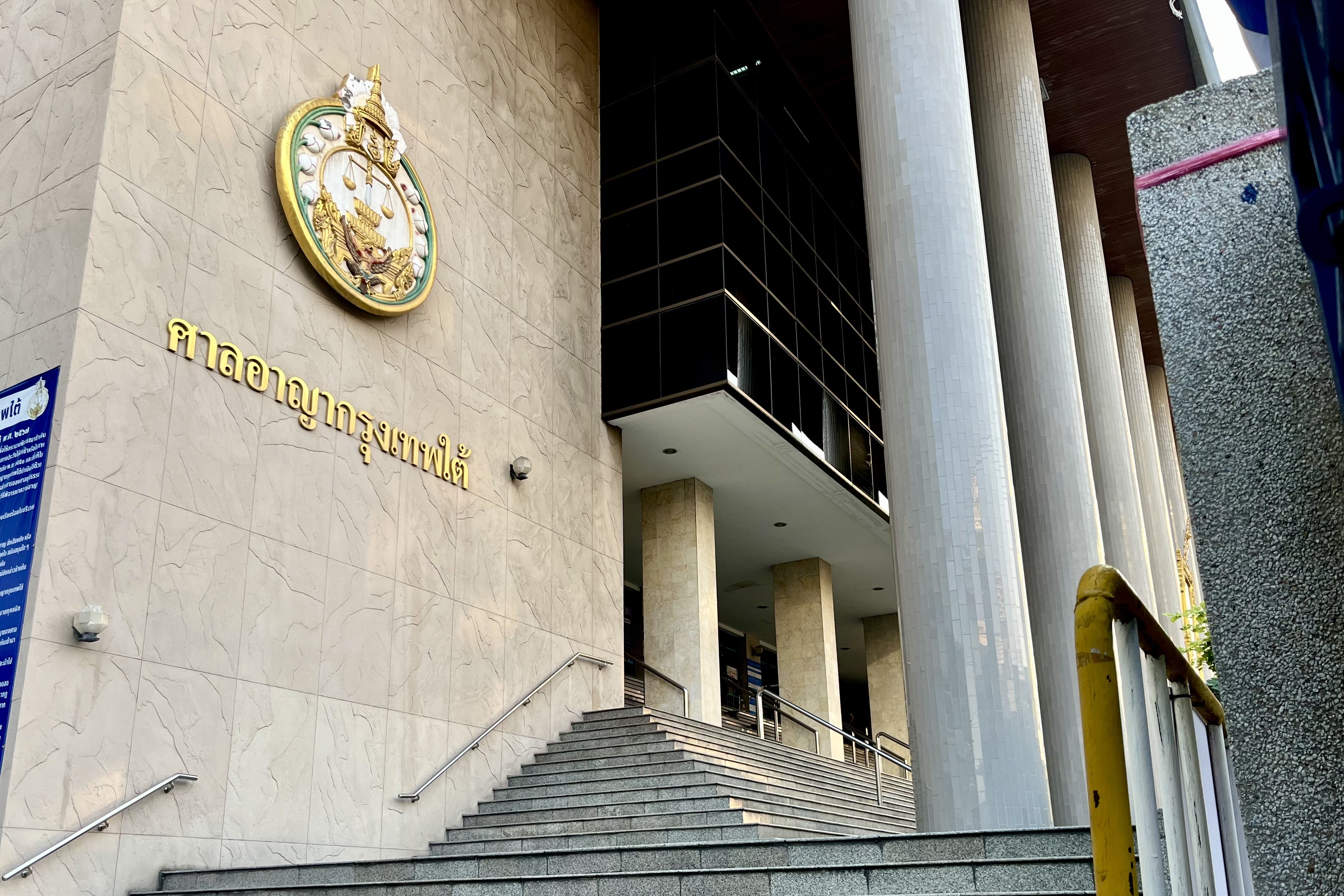The Bangkok South Criminal Court which is hearing a petion for the release of 43 detained Uyghurs, on Feb. 14, 2025. (Lukeit Kusumarn/BenarNews)
The petition concerns the fate of 43 Uyghur Muslims from China’s Xinjiang region, who have languished in an immigration prison since 2014.
A Thai court opened a hearing on Friday into the fate of 43 Uyghurs who have spent more than a decade in detention amid fears that the Thai authorities are preparing to deport them to China, where they would likely face imprisonment and inhumane treatment. As Radio Free Asia (RFA) reported, Chuchart Kanpai, a lawyer who has worked closely with members of the Uyghur community in Thailand submitted a petition on January 29 arguing that the men had spent enough time locked up on immigration charges and should be freed.
“The 40-plus Uyghurs in detention have not committed crimes in China. They have already served their sentences for illegal entry into Thailand but have endured deteriorating conditions in detention for more than 11 years,” Chuchart told the court yesterday, according to RFA.
As the Associated Press reported last month, the group is part of more than 300 Uyghurs who were detained in 2014 by Thai authorities near the Malaysian border, after fleeing oppression in China’s Xinjiang region. In July 2015, Thailand sent 173 of the Uyghurs, mostly women and children, to Turkey; the following week, it deported another 109 detainees to China against their will, prompting a storm of outrage from foreign governments and human rights groups. This left 53 Uyghurs stuck in Thai immigration detention, awaiting their applications for political asylum. Since then, five have died in detention, including two children.
Of the remaining detainees, 43 are being held in the cramped confines of the Immigration Detention Centre (IDC) in Bangkok, while another five are in Thai prisons serving sentences related to a 2020 escape attempt.
The filing of the petition by Chuchart Kanpai came amid renewed fears that they would be deported to China. The Associated Press reported that on January 8, “the Uyghur detainees were asked to sign voluntary deportation papers by Thai immigration officials,” prompting fears that they were about to be sent back to China. This prompted the 43 Uyghur men in immigration detention to write a letter that made a public appeal to halt what they called an imminent threat of deportation.
“We could be imprisoned, and we might even lose our lives,” stated the letter, according to the AP. “We urgently appeal to all international organizations and countries concerned with human rights to intervene immediately to save us from this tragic fate before it is too late.”
This prompted interventions from the United Nations and a number of human rights groups. “The treatment of the Uyghur minority in China is well-documented,” a group of U.N. experts said in a statement on January 21. “We are concerned they are at risk of suffering irreparable harm, in violation of the international prohibition on refoulement to torture.”
The U.N. alleged that the men “have been held in de facto incommunicado detention for over a decade,” with no access to lawyers, family members, or representatives from the U.N. refugee agency.
U.S. President Donald Trump’s Secretary of State Marco Rubio, during his confirmation hearings in the Senate, also promised that he would lobby Thailand against the deportations, which would be “one more opportunity for us to remind the world” about China’s oppression of the Uyghurs. The Royal Thai Police (RTP) subsequently denied that it was intending to deport the Uyghurs to China.
Thailand’s government has also come under fire for the conditions inside the IDC, where the 43 men are being held, which the Bangkok Post described as “weltering, foul-smelling, [and] cramped.”
“The conditions there are appalling,” Chalida Tajaroensuk, director of the People’s Empowerment Foundation, an NGO trying to help the Uyghurs, told the BBC last month. “There is not enough food – it is mostly just soup made with cucumber and chicken bones. It is crammed in there. The water they get, both for drinking and washing, is dirty. Only basic medicines are provided and these are inadequate. If someone falls ill, it takes a long time to get an appointment with the doctor.”
During Friday’s court hearing, RFA reported, the issue of the conditions was raised by the three people who gave testimony. “Many detainees face serious health issues with limited medical access,” the independent researcher Nirola Selima told the court. “Those inside are in terrible condition, as if slowly awaiting death.”
The court is set to reconvene tomorrow.

